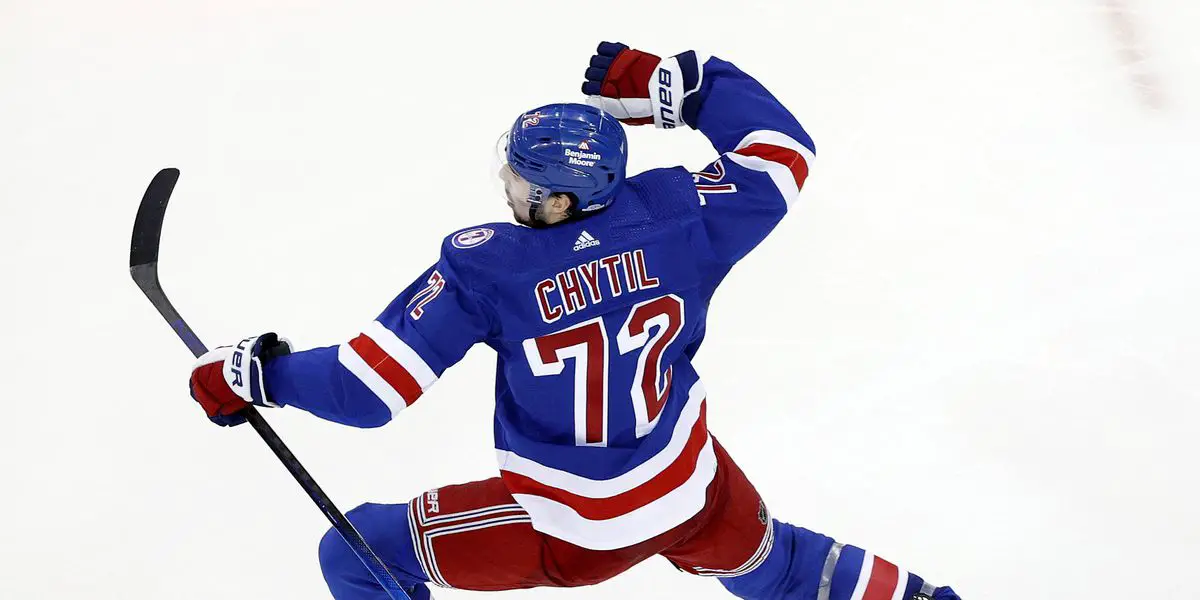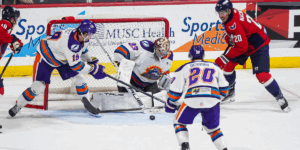
After the Rangers’ miracle run to the Eastern Conference Finals last year, it seemed like Filip Chytil finally broke out. After exploding for seven goals for the Rangers during this playoff run, Chytil was poised to take the 2C role after the inevitable departure of Ryan Strome. He even found time on the first power play unit during the playoffs, indicating his promotion to second-line center for this Rangers squad, or so most of us thought. In the offseason, the Rangers signed 29-year-old centerman Vincent Trocheck who had recently left the Carolina Hurricanes, which the Rangers had handily beaten in the playoffs. Trocheck was given 2nd center role, and Chytil, who is now in his sixth year with the club, was not given the opportunity to pick up where Strome left off. Roughly halfway through the season, let’s compare Trocheck and Chytil and see if the Rangers were wise to sign Trocheck instead of letting Chytil grow into the 2C role.
How do both players fit in the lineup?
It’s important to know the roles that Chytil and Trocheck play for this Rangers squad. Trocheck is a north-south style player, as he loves to take the puck through the middle of the ice and rip a shot from the top of the slot. He was brought in to replace Ryan Strome, as the Rangers hoped that the chemistry between numbers 10 and 16 would remain the same, despite Trocheck being an entirely different player. The results have been underwhelming, to say the least. Trocheck’s “skate up the ice and shoot” mentality does not work with Panarin’s game, and the two have failed to click together. Both players have been moved around the lineup to try to spark something, and Trocheck has found more chemistry with Chris Kreider and Jimmy Vesey than he has with Artemi Panarin.
On the flip side, Filip Chytil is a former first-round pick and is developing well. He was selected 21st overall in 2017 and has a flashy, skilled nature to his game. He can get open in the slot, and goals seem to find him whenever he releases the puck. Last playoffs, Chytil exploded for seven goals, and so far this season, he is on pace to destroy his previous point totals. As for chemistry, Chytil has looked good with everyone he has played with. He even gained limited time with Panarin as they set up the game-winner against New Jersey on December 12th. When he is put into a role that requires more from him, Chytil is more than capable of living up to expectations. Unfortunately, Gallant’s tendency to gravitate towards veteran players meant Chytil’s opportunity at 2C was short-lived.
Did the Rangers make the right choice to sign Trocheck?
As of the writing of this post, Filip Chytil has 17 points in 29 games, while Vincent Trocheck has 28 points in 37 games. That disparity seems to indicate that the Rangers were correct to sign Trocheck until you realize that nearly all of Chytil’s points come at even strength. He has only one goal while playing on the second power play unit, which gets very little opportunity to outperform the top unit. Trocheck, who is on the top unit, has 12 points on the power play, giving both players 16 points at even strength. The only difference? Chytil has played eight fewer games due to injury. Trocheck also averages about 20 minutes a game, while Chytil averages roughly 14 minutes. This time is likely allotted to power plays, penalty kills, and 6-on-5 situations, scenarios with which Chytil is not necessarily trusted.
This is not to say that Trocheck has been a bad player for the Rangers; he’s been anything but. His veteran presence in the locker room and on the bench has been great for the Rangers, and he brings an attitude to the team that every fan wants on their roster. He also has a shooting mentality that this Rangers’ squad should be keen to adopt and can be slotted up and down the lineup with no issues. He is a reliable, hard-working center and provides the Rangers with depth in the center position for the next seven years.
Unfortunately, that is where the problems begin with Trocheck. He was signed to a 7-year deal, with a no-movement clause for the first three years of the deal and a modified-no trade clause for the last four years. While this does technically give the Rangers some wiggle room, it could possibly come at the expense of keeping Chytil in the future. This contract also looks bad when you consider his age. He is 29 right now, which means he is at the peak of his career, and unless he channels his inner Joe Pavelski, he will likely decline going forward, making his contract look worse and worse.
Things look worse when you consider the Rangers could have and SHOULD have re-signed Andrew Copp, who was acquired at the trade deadline last year. They were reportedly looking for other options (which has become Trocheck) and has proved to be quite foolish, considering Copp signed for roughly the same amount as Trocheck and for two fewer years while also being a year younger. To put the finishing touch on this, Copp and Panarin had chemistry, and Copp was much more versatile as a player, meaning Chytil could’ve eventually taken over the 2C spot if need be, while Copp could be moved to the wing. If the Rangers were never going to give Chytil the reigns of second-line center, they could have at least signed Copp.
Should the Rangers be worried about keeping Chytil?
Chytil is already outperforming Trocheck at 5v5 while being significantly younger, which the Rangers should be happy yet concerned about. Chytil is having his best year to date in a contract year, so he is likely to demand a pay raise come June. While the two players are similar in skill level right now, it’s tough to say that Trocheck will be a better player than Chytil will be in the future.
The Rangers will be struggling to keep their players in the offseason. Aside from Chytil, they also have to worry about re-signing Vitali Kravtsov, Alexis Lafrenière, Julien Gauthier, and defenseman K’Andre Miller who is also having a career year and has emerged as an incredibly solid defenseman. Kaapo Kakko will also be a free agent the summer after next, and the Rangers will have to choose who to keep and who to re-sign.
Chytil has emerged as an incredibly reliable player for the Rangers and has succeeded despite playing mostly third-line minutes with a rotating door of wingers. He’s also a former first-round pick, which works in his favor as he is a skilled center who has shown flashes of brilliance before for New York. Finally, and arguably most importantly, Chytil is just 23, whereas Trocheck is pushing 30. This does not bode well for the longevity of Trocheck’s contract, as he is only set to decline while Chytil is going to improve year in and year out.
The Rangers have a pretty good center core in Zibanejad, Trocheck, and Chytil. Still, the addition of Vincent Trocheck and his 7-year contract will inevitably make it more difficult to keep the young star as he continues to emerge as a highly capable young center. While signing Trocheck adds value to the team, it was a move made by the Rangers with a lack of foresight and epitomizes this team’s lack of trust in their youth as they try to win another Stanley Cup.

Back to Rants – Ranting Rangers: A New York Rangers Podcast
Discover more from Inside The Rink
Subscribe to get the latest posts sent to your email.



